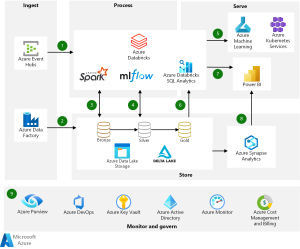What is a Modern Data Platform
A modern data platform is a comprehensive and integrated set of technologies, tools, and services that enable organizations to collect, store, process, manage, and analyze data in a unified and scalable manner. It provides a holistic approach to managing data throughout its entire lifecycle, from ingestion and analysis, to storage and retrieval. Data processing needs are constantly evolving. The need for faster intake and analytics of structured, semi-structured, and unstructured data is changing every day. A modern data platform enables storage, processing, and consumption of large volumes of complex data, and allows us to gather, store, and process data of all types and sizes from any data source.
A modern data platform typically includes several components, such as:
- Data ingestion: The ability to collect data from various sources, such as databases, cloud storage, social media, and IoT devices.
- Data storage: A scalable and reliable way to store and manage data, including traditional relational databases, as well as modern data storage solutions such as data lakes and data warehouses.
- Data processing: The ability to process large volumes of data in real-time, using technologies such as Apache Spark and Apache Kafka.
- Data analysis: The ability to analyze data using advanced analytics and machine learning algorithms.
- Data governance and security: The ability to manage data access, compliance, and security across the entire platform.
- Data visualization and reporting: The ability to visualize and report data insights using dashboards and other visual tools.

Fig. 1: Azure Modern Data Platform.
Diagram taken from Microsoft Azure Documentation at:
https://learn.microsoft.com/es-es/azure/architecture/solution-ideas/articles/azure-databricks-modern-analytics-architecture
A Modern Data Platform:
- Is a single, powerful, and extensible data platform.
- Can handle a broad array of data types.
- Can support new types of analytics.
- Provides automated and robust data pipelines and ETL processes.
- Has the ability to provide secured access of data to a variety of users – analysts, data engineers, and data scientists.
- Provides an easy-to-use environment for developing data applications, including several options for self-service.
- Guarantees cost-effective scale, performance, and concurrency.
- Requires least maintenance, so that users can focus on delivering business objectives instead of being entangled in day-to-day operational activities.
Why a Modern Data Platform?
- Rapidly growing volume of data: The volume of data being generated today is growing at an unprecedented rate, and traditional data management solutions are not capable of handling this level of data growth. A modern data platform provides a scalable and flexible architecture that can handle large volumes of data and accommodate future growth.
- Need for real-time insights: In today’s fast-paced business environment, decision-makers need real-time insights to make informed decisions quickly. A modern data platform enables organizations to analyze data in real-time, which can help them respond quickly to changing market conditions and customer needs.
- Diverse data sources: Data is now being generated from a wide range of sources, such as social media, mobile devices, and IoT devices. A modern data platform provides the ability to collect and integrate data from multiple sources, enabling organizations to gain a comprehensive view of their business.
- Growing complexity of data: Data is becoming more complex, with a variety of data types, formats, and structures. A modern data platform provides the ability to process and analyze complex data, including unstructured data such as text and images.
- Compliance and security: Compliance and security are critical concerns for organizations, and a modern data platform provides the ability to manage data access, compliance, and security across the entire platform.
- Data Catalog: A data catalog is critical in preventing a data lake from becoming a ‘data swamp’. A modern data lake provides a unified data catalog and becomes a single, trusted source of data.
- Scalability: It provides flexible scalability, handle increased demands efficiently and effectively, ensuring smooth operations and growth even as workloads expand.
- ML, AI and Business Intelligence Integration: The design and architecture of a modern data platform seamlessly integrate with consumption tools for Business Intelligence, Machine Learning and Artificial Intelligence.
Value of Modern Data Platform
A modern data platform offers all of the advantages of cloud computing – it’s cheaper, elastic, and highly scalable. Along with these, there are the following additional values:
- Elimination of data silos.
- Operational simplicity.
- ‘Pay-as-you-go’ compute.
- Faster time-to-market.
- Centralized security: access control and activity logs.
- 24×7 availability.
- High availability.
- Built-in recoverability.
- Easy scaling.
- Minimal administrative and operational support.
- Provision for encryption and masking for regulatory compliance.
- Foolproof access control implementation.
Benefits of a Modern Data Platform
- Lower operational cost and nearly zero fixed cost.
- Elasticity.
- Enhanced Security
- Compliance
- Robust Business Continuity.
- Centralized Management and Monitoring.
- Better utilization of IT staff.
Case Studies:
https://www.microsoft.com/en-us/insidetrack/azure-data-lake-connects-supply-chain-data-for-advanced-analytics
https://www.microsoft.com/en-us/insidetrack/powering-digital-transformation-at-microsoft-with-modern-data-foundations

